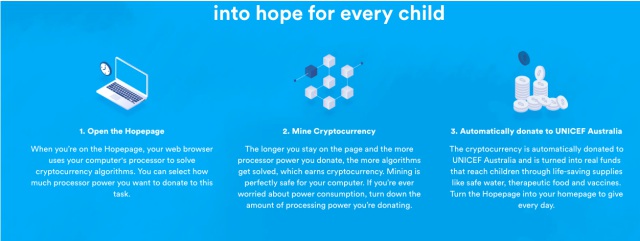
While using your computer’s resources for cryptocurrency mining using a browser extension has been painted under a bad light, UNICEF Australia has now decided to put it to good use.
Today, it has announced a browser-based cryptocurrency mining platform dubbed as HopePage that will use your system’s processing power to generate funds in the form of virtual currency.
When you visit HopePage, the website will request your permission to be able to run cryptocurrency algorithms and how much CPU power (between 20% to 80%) you want to dedicate to this task.
Once you’ve agreed to these demands, HopePage will use your system’s processing power to generate funds, as long as the page remains open in your browser. With regards to the same, UNICEF explains that: “Mining is perfectly safe for your computer. If you’re ever worried about power consumption, turn down the amount of processing power you’re donating.”

The HopePage is powered by Coinhive’s AuthedMine.com platform, which lets you embed JavaScript miners in your website and mine Monero using a third-party’s CPU power. The cryptocurrency collected is converted to real currency and donated directly to UNICEF Australia, who can then use it to help children in need of life-saving supplies like safe drinking water, food, and vaccines.
UNICEF Australia’s director of fundraising and communications Jennifer Tierney said, “We wanted to leverage new emerging technologies to raise awareness about current humanitarian crises and raise funds to support children caught up in them.”
This is not the first time UNICEF has resorted to cryptocurrency mining to raise funds for children. Earlier this year, the organisation asked some gamers to install mining software Claymore to help support the many millions affected by the Syrian Civil War.
The HopePage is currently supporting the organisation’s response to the Rohingya crisis, especially for children who’ve fled their homes in Myanmar and are now living in refugee camps in Bangladesh. There are close to 1,850 people donating their system’s processing power for fund collection.










